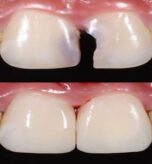If you’re looking for a fast and long-lasting way to transform your smile, you may have come across dental veneers. But what exactly are veneers for teeth, and are they the right cosmetic treatment for you?
In this comprehensive guide, we’ll break down:
- What veneers are
- How they work
- Types of veneers available
- Pros and cons
- What the procedure involves
- And who makes a good candidate
Whether you’re dealing with chipped, stained, or misaligned teeth—or simply want a picture-perfect smile—this article will help you make an informed decision.
What Are Veneers?
Dental veneers are thin, custom-made shells of tooth-colored material that are bonded to the front surface of your teeth. They’re designed to improve the appearance of your smile by covering imperfections such as:
- Discoloration or staining
- Chipped or broken teeth
- Gaps between teeth
- Mild misalignment or uneven sizing
- Worn-down enamel
Veneers are considered a cosmetic dental treatment, but they can also help protect teeth from further damage in some cases.
What Are Veneers Made Of?
There are two main types of veneers, based on the materials used:
- Porcelain Veneers
- Durable and stain-resistant
- Highly natural-looking
- Last 10–15 years with proper care
- Custom-made in a dental lab
Best for those looking for long-term, high-quality results.
- Composite Resin Veneers
- Applied directly to the tooth
- Less expensive than porcelain
- Typically last 5–7 years
- Easier to repair if damaged
📝 Ideal for quick fixes or those on a budget.
What Do Veneers Fix?
Veneers are versatile and can address a wide range of aesthetic concerns:
| Dental Issue | Can Veneers Help? |
| Tooth discoloration | ✅ Yes |
| Minor chips or cracks | ✅ Yes |
| Gaps between teeth | ✅ Yes |
| Uneven or irregular teeth | ✅ Yes |
| Misaligned teeth | ⚠️ Only mild cases |
| Weakened teeth | ❌ Not ideal (a crown may be better) |
The Veneer Procedure: What to Expect
Getting veneers is typically a multi-step process spread over two or more appointments:
Step 1: Consultation & Smile Planning
Your dentist will assess your oral health and goals, then recommend the best veneer type for you.
Step 2: Tooth Preparation
A small amount of enamel is removed (usually <0.5mm) to make room for the veneer and ensure a natural fit.
Step 3: Impressions & Temporary Veneers
Impressions are taken and sent to a dental lab. While you wait, temporary veneers may be placed.
Step 4: Veneer Placement
Once your custom veneers are ready, the dentist bonds them to your teeth using a special adhesive and light to harden it.
The result? A bright, symmetrical, and natural-looking smile—instantly upgraded.
Pros and Cons of Dental Veneers
Advantages
- Instant cosmetic transformation
- Natural appearance and feel
- Stain-resistant (porcelain)
- Minimal tooth alteration required
- Boosts self-confidence
Considerations
- Irreversible (requires enamel removal)
- Can be costly, especially for porcelain
- Not suitable for heavily decayed or weak teeth
- May eventually need to be replaced
Who Is a Good Candidate for Veneers?
You may be a great candidate if:
- Your teeth are generally healthy and strong
- You want to correct aesthetic flaws like chips, stains, or gaps
- You practice good oral hygiene
- You don’t grind your teeth excessively (bruxism)
If you have gum disease, large fillings, or extensive tooth decay, your dentist may suggest alternative treatments like dental crowns or orthodontics.
Cost of Veneers: What to Expect
The cost of veneers varies depending on the type, location, and dentist experience:
- Porcelain veneers: $900–$2,500 per tooth
- Composite veneers: $250–$1,500 per tooth
Since veneers are considered cosmetic, they’re typically not covered by insurance. However, many dental offices offer financing plans.
Final Thoughts: Are Veneers Right for You?
Dental veneers offer a fast, effective, and customizable way to achieve a confident smile. Whether you’re looking to fix one tooth or transform your entire smile, veneers could be the solution.
Talk to your dentist about your goals, budget, and options to see if veneers are a good fit.
FAQs
Do veneers ruin your natural teeth?
No, but they do require a thin layer of enamel to be removed, which is irreversible. When done properly, veneers are safe and long-lasting.
How long do veneers last?
Porcelain veneers can last 10–15 years or more with proper care; composite veneers usually last 5–7 years.
Can veneers stain?
Porcelain veneers are stain-resistant, but the cement underneath can discolor over time if not properly maintained.



